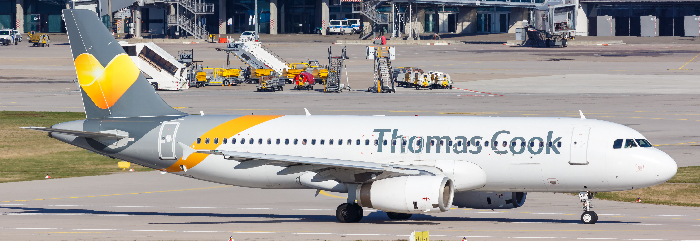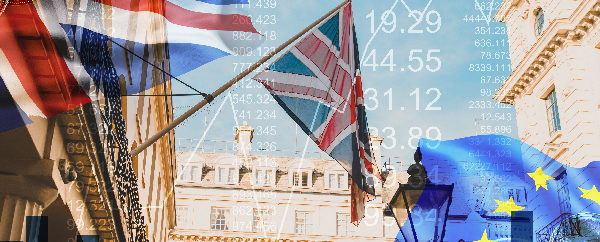The collapse of the travel operator Thomas Cook has put Operation Matterhorn into effect, described as the UK’s biggest ever peacetime repatriation of citizens with an estimated 150,000 holidaymakers left stranded overseas by the travel agent entering administration.
It’s such an undertaking that holiday firms based in Switzerland, near the Alpine mountain that gives Operation Matterhorn its name, are complaining that the name alone could have a negative impact on tourism in their region.
The collapse has even more direct implications for customers, investors, travel insurers and credit card providers, all of whom are likely to be left to foot the bill to some extent.
So why wasn’t Thomas Cook considered ‘too big to fail’ by the British government, when they have stepped in to bail out banks in the past?
What just happened?
The demise of Thomas Cook happened fast. While the company’s financial problems have been apparent for some time, the final descent into administration took place over the weekend and by the time the markets opened on Monday morning, it was already too late for investors.
A total of £900 million had already been pledged to the company by the banks and via investment from Fosun Group, but this left it in need of a further £200 million to get through the winter before business – hopefully – would have picked up again in the new year.
However, the UK government chose not to offer the requested bailout. Ironically it seems likely this was because investing would have simply been ‘kicking the can down the road’ with the company collapsing at a later date instead.
That phrase, of course, is more commonly associated with the repeated delays to Brexit, which have done little to help British consumer confidence and may have played a direct role in rendering Thomas Cook unviable.
On the markets
Those investors who were able to act ahead of the curve did so on Friday September 20th, withdrawing substantial amounts from Thomas Cook’s share price.
A year ago the company’s stock was trading at around £1.50. On Friday it was valued at 3.5p.
As of Monday morning on September 23rd, Thomas Cook’s shares suspended trading altogether.
In response, other travel operators saw their share price increase:
- On the Beach up 1.5%
- IAG up 1.6%
- Ryanair up 3%
- easyJet up 6%
- TUI up almost 10%
This is an indication that investors anticipate Thomas Cook’s market share will be redistributed among the other leading brands in the industry, and is perhaps a sign that confidence in the travel market as a whole remains strong.
What went wrong?
There are several factors that have combined to render Thomas Cook untenable:
- Bad weather has led to fewer people booking foreign holidays in the UK.
- Brexit and other economic uncertainties have seen more people take staycations.
- This is exacerbated by the weaker pound making foreign holidays more expensive.
- Thomas Cook have also been criticised for failing to adapt to online competition.
- Finally, the UK government rejected a call for a £200 million bailout.
There is no one reason why Thomas Cook could no longer keep trading, but like many failed businesses, even in a relatively strong sector the combination of negative influences left it with no remaining options.
In total there are five businesses owned and operated by Thomas Cook that are part of ABTA – The Travel Association and ATOL.
Because of this, the collapse directly affects customers of:
- Thomas Cook Retail Limited (ATOL 0020)
- Thomas Cook Tour Operations Limited (ATOL 1179)
- TCCT Retail Limited (ATOL 10585)
- Future Travel Limited (ATOL 5704)
- Freedom Travel Group Limited (ATOL 6042)
Those whose package holidays are ATOL protected should be covered, whereas others may need to claim against their private travel insurance or their credit card provider for holidays that cost over £100.
Why no bailout?
Unlike customers, investors are unlikely to have any claim to recover any lost money – as we all know, investments can go down as well as up.
But many will be asking why the government did not consider Thomas Cook ‘too big to fail’ considering the scale of the repatriation effort required just to bring their customers back to the UK.
The response of the other travel operators’ share prices is worth taking into account here, as it indicates confidence in the travel industry overall remains strong.
In contrast to this, when one of the major banks collapses, it’s normal to see the markets panic in response, while accountholders of other banks and building societies queue round the block to withdraw their savings as cash.
Bailing out the banks is less about protecting customers – many of whom are covered by the Financial Services Compensation Scheme anyway – and more about preventing the UK finance sector as a whole from collapsing like it did in 2007-08.
For investors, the lesson is one of leverage, and of ensuring to carry out full risk assessments before putting funds into a beleaguered brand, even if it’s one that’s been a hallmark of the high streets for decades or more.
https://headlinemoney.co.uk/Releases/Read/143610
https://headlinemoney.co.uk/Releases/Read/143609
Disclaimer: The information provided here is not investment, tax or financial advice. You should consult with a licensed professional for advice concerning your specific situation.




